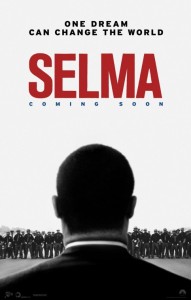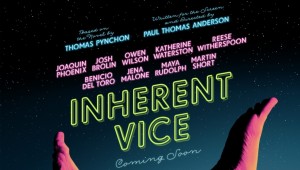Inherent Vice (15) / Selma (12A)
With the Academy Awards looming (22nd Feb), Geekzine UK Editor-in-Chief, Andy Jamieson, takes a look at these two recent releases that, whilst not being fully snubbed by Oscar (two nominations each; Best Film and Best Original Song for Selma, Best Costume Design and Best Adapted Screenplay for Inherent Vice), have not perhaps received the recognition they both deserve.
On the surface, these are two very different films, one fictional, sourced from an acclaimed novel, the other based on real events. One a comedy crime-drama, the other a serious historical drama. On closer inspection there are some subtle shared similarities, beyond the setting of the late sixties, a crucial time in the cultural make-up of the USA.
Inherent Vice, although set in 1970, is a sixties movie, insists the film’s director, the ever-inventive Paul Thomas Anderson. He has stated on several occasions that the movie is about the decline of the counter-culture, of a time when heroin became the dominant drug over pot, and with it came the death of an emerging idealism, and the sinister rise of the American state of oppression. Anderson insists that this is what the original novel of Inherent Vice, by the mercurial Thomas Pynchon, was all about, beyond its stoner P.I surface. Selma , the third feature film from director Ava DuVernay, is set in 1965, and recounts the seminal Montgomery marches taken by Dr Martin Luther King Jr and his followers. Their cause is the pursuit of equality, of pushing through important legislation that would grant voting rights for the oppressed African American population. In their path stand the bigoted law enforcers of Albama state police. In particular, the back and forth scenes between Dr King (portrayed by David Oyelowo) and President Lynden B. Johnson (the ever-impressive Tom Wilkinson) are fascinating to watch and have been the cause of some controversy with various historical inaccuracies being levelled at these scenes. They are brief but they are powerful, and paint LBJ as a leader faced with difficult choices yet struggling to comprehend the situation he is faced with.
Both films share stunning cinematography (DOP Robert Elswit washes his visuals through with a dreamscape smog for Inherent Vice, whilst Bradford Young utilises a subdued palette for Selma) and production design, depicting the sixties as a time of change and turmoil, when new ideas challenged old conventions. Excellent scripts (Inherent Vice’s written by Paul Thomas Anderson, Selma’s by Paul Webb and director Ava DuVernay), both very different from the other, are crammed with memorable characters. Inherent Vice adopts a more vignette-fuelled structure, where the plot occasionally takes second place to its character moments, whereas Selma’s characters revolve around historical events. The most noticeable drawback here, in cinematic terms, is that with Selma we are bombarded by numerous characters, from King’s retinue, and of the populace of Selma itself, who have very little screen time with which to make their impact, and this can lead to some confusion on the part of the viewer, particularly if coming to the subject matter fresh. Events occur, characters arrive and disappear. The centre of the film rightly focuses on King, and British actor David Oyelowo’s magnetic performance (incredulously ignored by the Oscars and BAFTA) anchors the film and provides it with its narrative drive.
Selma is nothing less than a powerful, important movie, and it is hard not to think of its relevance in terms of some of the recent racially-fuelled violence in America, in particular the tragedies that have occurred in Ferguson, Missouri, and the death of Eric Garner. Ava DuVernay’s direction is not interested in draping her film with overt sentimentality but instead seems keen to remind us of what an incredible human being Dr King was, flaws and all; indeed, we are given insight into the fact that J. Edgar Hoover’s FBI attempted to destabilize King’s marriage (Brit Carmen Ejogo gives a sensitive portrayal as Coretta Scott King) by exposing his past infidelities. It is not a film crammed with historical set piece powerhouse scenes (aside from King’s speeches), and focuses instead on showing us King with his family, and with his followers, as they agonise over how to proceed with their movement, in the face of a indignant LBJ, and a hateful state governor (Tim Roth, excellently callous as Governor George Wallace). Selma is powerful cinema, and Oyelowo’s performance elevates it into essential viewing.
With Inherent Vice we have what could have been a befuddling haze of a movie, stabilized and powered by Joaquin Phoenix’s star turn as Doc Sportello; a detective who’s investigative methods vary between happenstance and instinct, his talent for following his case’s trail wherever it may lead him, lending itself to many contrasting scenes of comedy and threat. Framed with the relatively familiar set-up of the Private Investigator being hired to find Someone Important, Inherent Vice relishes these conformities, and sets about playing as much as possible with the trappings of its crime drama leanings (femme fatales, sinister villains, romance, intrigue, sudden violence) to find the humour within. It is a knowing, good natured humour, and the performances throughout balance this crime-drama-comedy ever so finely. Josh Brolin, Owen Wilson and Reese Witherspoon, of the more well known names, shine in great supporting roles, whilst newcomer Katherine Waterston, and the relatively untested Joanna Newsom as the film’s relaxed narrator, are a pleasant surprise. Inherent Vice delights, amuses and thrills, sometimes all at once. Think the Coen’s The Big Lebowski by way of Robert Altman’s The Long Goodbye, and you are almost there.
So, whilst not exactly double-bill material in the strictest sense, the two films do compliment each other in unexpected ways. The shadow of a stern, corrupt authoritarian system looms over the plotlines of both films. Two talented film-makers have given us a glimpse into two very startling visions of the sixties, albeit one based on fact, the other fiction. Come Oscar night, they will no doubt be forgotten. However, history will be kinder than any annual awards ceremony.
Reviews by Andy Jamieson, Editor-in-Chief of Geekzine UK

